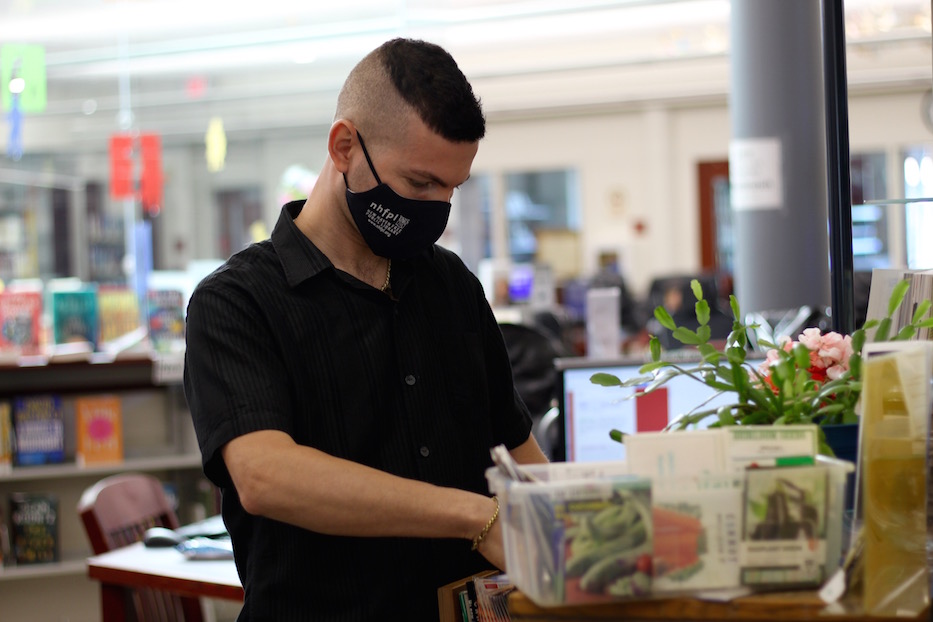
Community Gardens | Arts & Culture | New Haven Free Public Library | The Hill | COVID-19 | Arts & Anti-racism
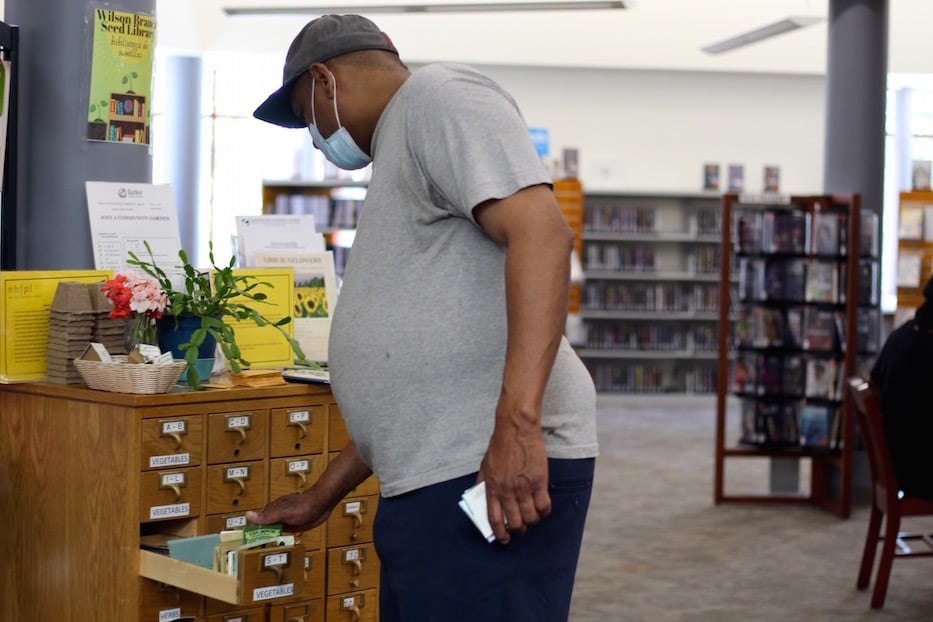
Mark Relaford at the Wilson Library on a recent Monday. Lucy Gellman Photos.
Mark Relaford sifted through packets of seeds, studying each label. In one drawer, images of blooming collards shimmered beside bright green peppers and vines heavy with squash. Envelopes for zinnias and deep-veined lettuce sat atop each other. There were large orange carrots and small green peas, striped cucumbers and frizzy heads of fennel. He selected seeds for tomatoes, basil, cucumbers and corn. Just a few feet away, a fleet of baby sunflower plants peeked out hopefully.
Relaford is starting a garden thanks to the seed exchange at the Wilson Library, located just off Howard Avenue in the city’s Hill neighborhood. This spring and summer, the library is piloting the program in an effort to bring awareness to the neighborhood’s network of community gardens and help Hill residents grow their own food. While the initiative is housed at the library, it has gained support from Gather New Haven, which operates farms on Liberty and Ward Streets, and Common Ground High School.
It is the brainchild of Wilson librarian Bill Armstrong, who served as the literacy librarian at the main branch downtown for 24 years before coming to Wilson in 2020. He is also launching a program to cover the neighborhood with sunflowers by the end of the summer.
“It looks like an agricultural project, but it’s actually an art project,” he said. “We wanted to do something that would get the community involved. It’s there to draw attention to the neighborhood, and to urban agriculture ... it’s another form of literacy.”
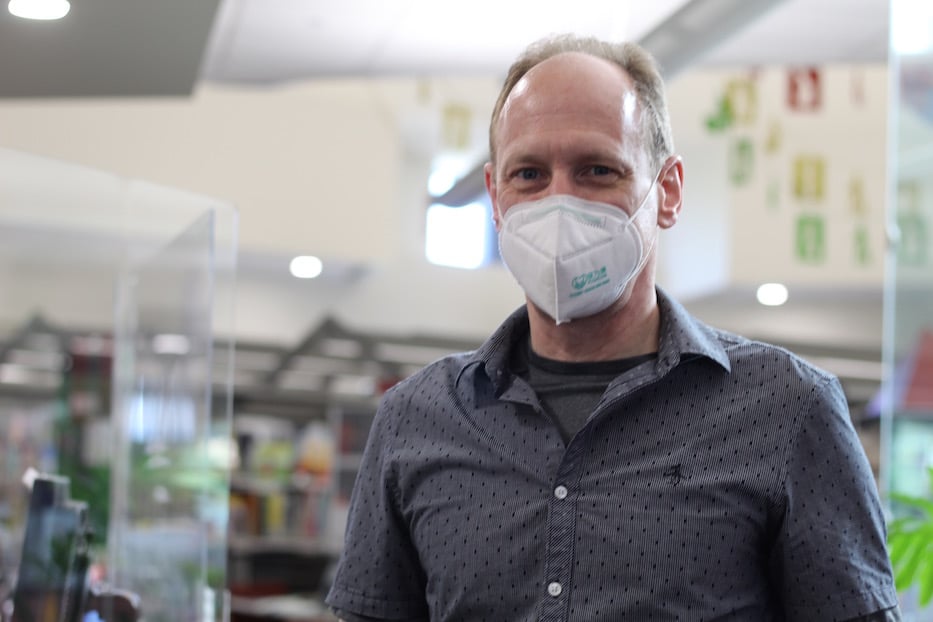
Bill Armstrong. He called the seed exchange and 1,000 Sunflowers project "another form of literacy."
Armstrong was inspired to start the seed exchange after hearing about other libraries piloting it around the country (among them is the Hamden Public Library). He has dubbed it a seed exchange—rather than a seed library—because home and community gardeners are also invited to donate their extra seeds before they expire. Since it started earlier this spring, patrons have picked up seeds for basil, tomatoes, cilantro, peas, green beans, lemon balm, chives, asters, scallions, squash, radishes, and kale among other plants and flowers.
It’s also intended to double as an exchange for information. In addition to the seeds, packets of which are housed in an old card catalogue, there are books on gardening in English and Spanish. Flyers list the neighborhood’s community gardens by street and announce the sunflower project. Small planter kits in fiber cups sit nearby. For patrons who aren’t yet ready to grow their own vegetables, the library has assembled take-and-make kits with a brilliant sunflower design.
On Monday, Relaford looked over his options, trying to figure out what would fit in his yard. Born and raised in nearby North Haven, he grew tending a garden with his dad, and said he’s missed cultivating the land. He remembered planting okra, black eyed peas, lima beans, corn and squash, collard greens and small, sweet watermelons that leaked juice as soon as they were sliced open. Decades later, he is planting a garden in his backyard on Howard Avenue. He said he’s excited to see the vegetables take root.
“It’s me and some of my mates,” he said. “We just want to enjoy nature, just to see things grow and prosper for all.”
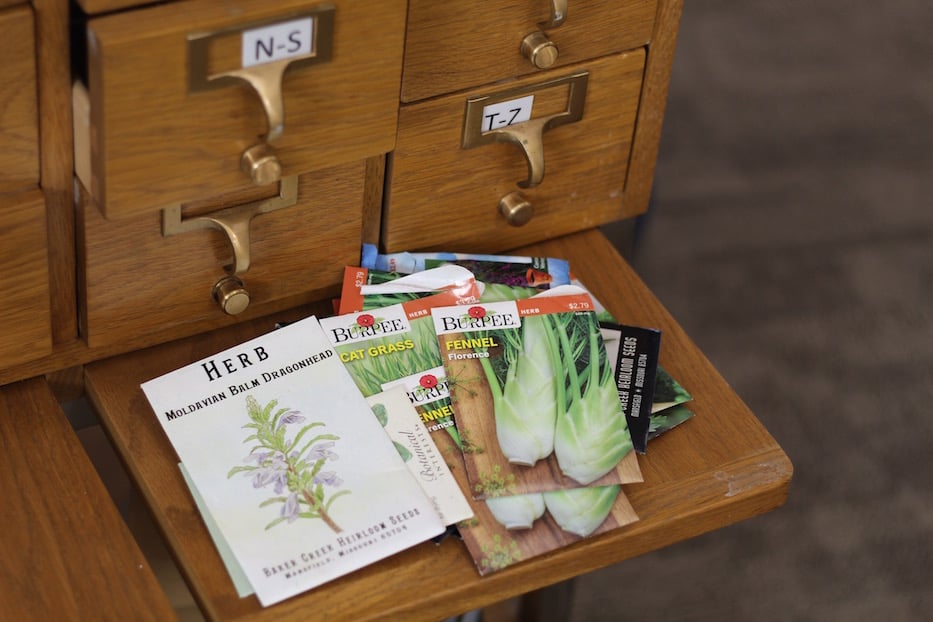
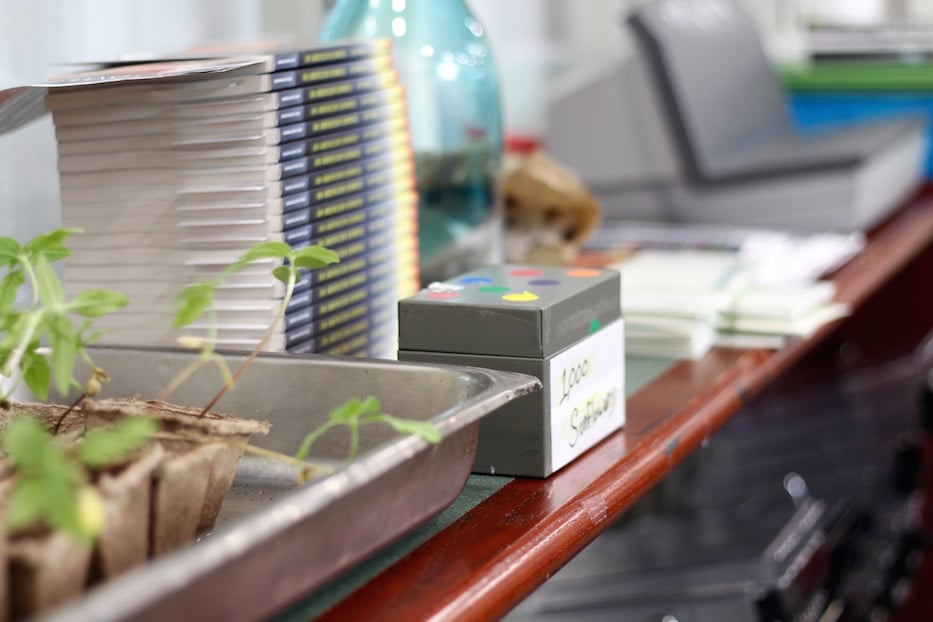
Sunflower seedlings sit beside a stack of Joy Harjo's An American Sunrise, which is this year's National Endowment for the Arts Big Read Book.
That’s also the idea behind the 1,000 Sunflowers Project, through which the library is working with Hill residents to plant and nurture sunflowers across the neighborhood. Armstrong said the flowers were a natural choice for both their beauty and their environmental benefit. As he did research on the plants, he learned that sunflowers pull heavy metals and radioactive isotopes out of toxic soil in a process called phytoremediation.
Scientists planted them in Chernobyl after the eponymous nuclear disaster. In 2011, teams of researchers tried the same thing at Fukushima. If he needed another reason, the National Garden Bureau has named 2021 the “Year of the Sunflower.”
By the circulation desk Monday morning, Library Technical Assistant Jeffrey Panettiere helped Relaford measure out his seeds before checking out his other materials. Behind him, a huge stack of gardening books waited eagerly for pick up from another patron. As Relaford headed out, new Branch Manager Meghan Currey said she is excited to watch the project grow. She recently moved into a house in Hamden, where she “can’t wait to get my hands in the mud” and plant a garden outdoors.
Already, both the seed exchange and the 1,000 Sunflowers project have received some love from gardeners in the neighborhood. On Wednesday morning, Leslie Radcliffe praised the exchange as she prepared to plant kale and collard green starters in her garden. This year, her crop includes green beans, zucchini, jalapeno and hot peppers, tomatoes, black eyed peas, blueberry and strawberry bushes.
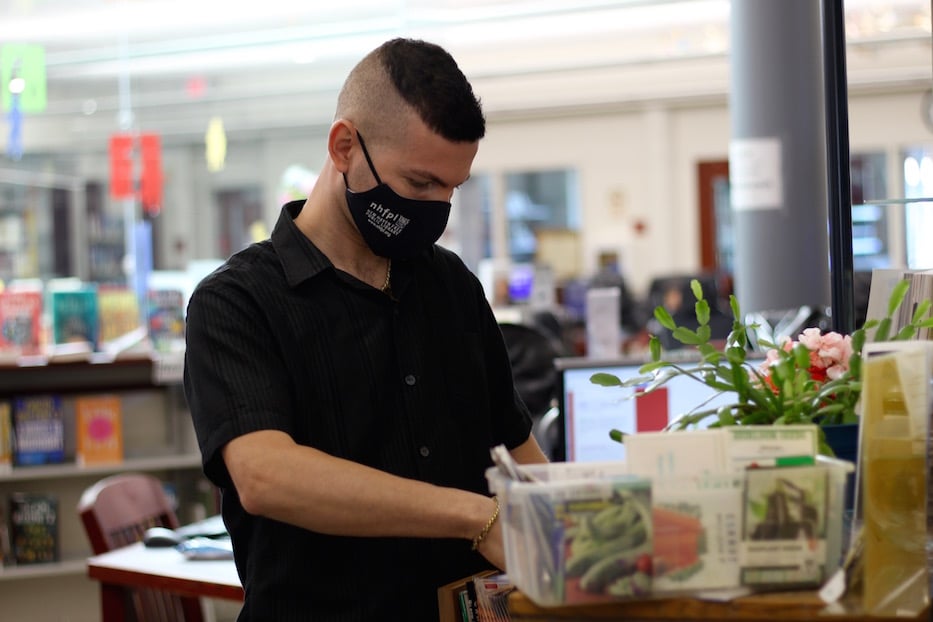
Library Technical Assistant Jeffrey Panettiere.
Radcliffe “got bit by the [gardening] bug” around 2010, after she bought her home and noticed an empty lot at the end of the street. She is now the garden coordinator at the Truman Street Garden and Greenspace and works closely with Jamilah Rasheed, who runs the Field of Greens community garden on Arthur Street. As a part of her fierce neighborhood advocacy, she was also a driving force behind the neighborhood farm that broke ground in 2017.
“I think it's a wonderful thing!” she said of the seed exchange. “The library has morphed to no longer be a depository of books. It has changed so that there are a lot of community programs, and the connecting and the outreach that they do is wonderful. A packet of seeds will cost you anywhere from 50 cents to two dollars. We don't have any grocery stores in the inner city. So to be able to go pick up seeds … planting is really something that anybody can do.”
She added that she’s excited to see the sunflower program take off, painting an image of Truman Street covered in bright bursts of yellow. She also wouldn’t be opposed to a rebirth of “guerrilla gardening,” in which gardeners throw extra seeds into peoples’ yards and see if something takes root. Years ago, City Point resident Chris Schaefer became known for it.
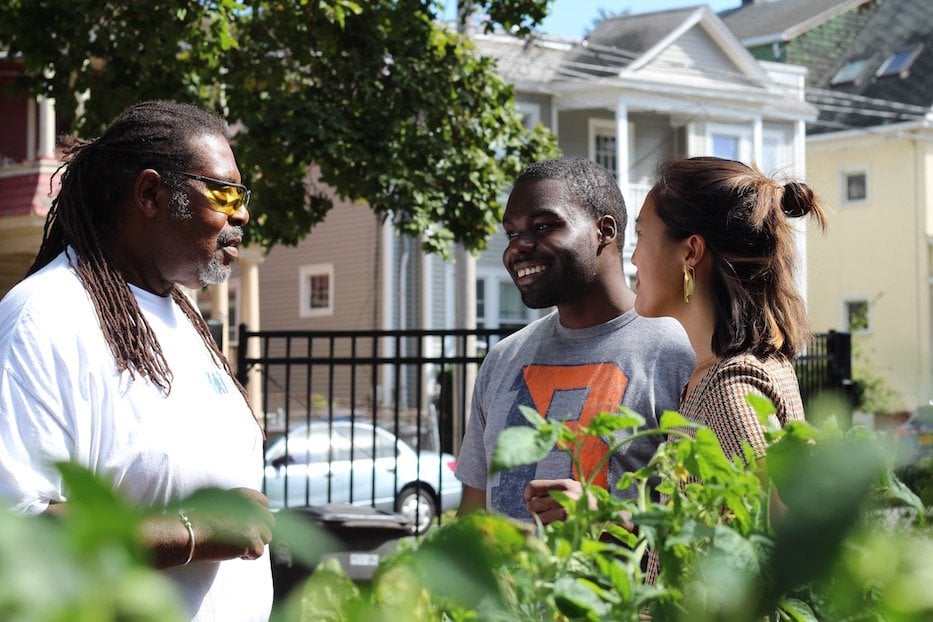
Stacy Spell with with Dr. Robert Rock and Yale University medical student Jenny Tsai at the Little Red Hen in October 2019. Lucy Gellman Pre-Pandemic File Photo.
Stacy Spell, who runs the Little Red Hen farm in the city’s West River neighborhood, said he is also happy to see the project unfold. For him, the exchange is not just about covering the neighborhood with vegetables and sunflowers—it’s about getting neighbors to spend time with each other again. He said that he feels the city’s recent wave of gun violence, including three homicides in the past five days, is related to the fact that people don’t talk to each other. He started the garden a decade ago as a way to change that (read more about that here, here and here) and believes that horticulture can lead to healing.
“As long as we stay in our silos, as long as we're estranged, as long as we keep our biases, we will never learn to work together as a people,” he said. “If we’re estranged, it’s easy for you to watch my grandson, my son, or my child get involved in something and not say anything. It’s about building those new relationships. And when we build those relationships, that's the fundamental seeds of change.”
He also sang the praises of sunflowers as super-pollinators. A few years ago, he planted four different varieties in his home garden, and several at the Little Red Hen. Almost immediately, he saw a change in the honey that the garden’s bees, who had been feeding on invasive mugwort, were producing. It changed from a dark molasses color to full of light. When he heard about the 1,000 Sunflowers project, it seemed like a natural fit for the neighborhood.
“I want to plant the seeds that peace is possible,” he said. “We can do something to change the tides of violence.”
Wilson Library is open Monday-Thursday and Saturday; a complete list of hours is available here. The library is located at 303 Washington Ave. in the city's Hill neighborhood.

